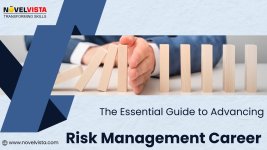Sofie davis
New member
In today's unpredictable business world, risk management isn't just a back-office function—it's a career path filled with growth, leadership, and impact. Organizations across industries are searching for professionals who can turn uncertainty into opportunity. If you're a risk manager (or aspiring to be one), this guide will show you how to build the skills, credibility, and recognition you need to move your career to the next level.

The world of risk management is constantly evolving. It's no longer limited to compliance checklists or financial audits. Now, professionals are expected to address:
 By staying informed about emerging risks through reports, webinars, and industry news, you position yourself as a forward-thinking professional who can help organizations thrive in uncertain times.
By staying informed about emerging risks through reports, webinars, and industry news, you position yourself as a forward-thinking professional who can help organizations thrive in uncertain times.
 Step 2: Sharpen Your Analytical Edge
Step 2: Sharpen Your Analytical Edge
Risk managers aren't just “problem spotters.” They're decision enablers. Employers want professionals who can:
 Step 3: Level Up with Global Certifications
Step 3: Level Up with Global Certifications
Want to stand out in a crowded job market? Certifications are your career boosters.
Training based on international standards like ISO 31000:2018 Training is one of the most recognized ways to build credibility. It proves you understand risk management best practices that apply across industries.
 Benefits include:
Benefits include:
Here's a secret: technical skills will get you hired, but soft skills will get you promoted.
Top risk managers excel in:
 Step 5: Map Out Your Career Path
Step 5: Map Out Your Career Path
Risk management isn't one-size-fits-all. Depending on your interests, you can specialize or broaden your scope. Popular career paths include:
The most successful risk managers are lifelong learners. Attending workshops, advanced training programs, and joining professional communities keeps you ahead of the curve. Every new skill or certification you gain is an investment in your future career resilience.
One of the smartest moves you can make in risk management is earning an ISO 31000 certification . This globally recognized framework equips you with structured methods to identify, assess, and manage risks across industries. For professionals, it's more than just a credential—it's proof that you can apply international best practices in real-world scenarios. Employers value this certification because it signals both credibility and expertise, making you a stronger candidate for promotions, international roles, and leadership positions. Whether you want to stand out in job applications or climb the ladder within your current organization, ISO 31000 certification gives you the professional edge to advance confidently.
Advancing in risk management is about more than experience—it's about evolution. To grow, you need to:

 Step 1: Keep Up with the New Face of Risk
Step 1: Keep Up with the New Face of Risk
The world of risk management is constantly evolving. It's no longer limited to compliance checklists or financial audits. Now, professionals are expected to address:- Cybersecurity threats
- Supply chain vulnerabilities
- Data privacy risks
- Environmental and climate-related challenges
Risk managers aren't just “problem spotters.” They're decision enablers. Employers want professionals who can:
- Interpret complex data
- Use risk modeling and assessment tools
- Recommend clear, actionable solutions
Want to stand out in a crowded job market? Certifications are your career boosters.
Training based on international standards like ISO 31000:2018 Training is one of the most recognized ways to build credibility. It proves you understand risk management best practices that apply across industries.
- Enhanced career opportunities
- Earning potential
- Stronger professional reputation
 Step 4: Grow Beyond Technical Skills
Step 4: Grow Beyond Technical Skills
Here's a secret: technical skills will get you hired, but soft skills will get you promoted.Top risk managers excel in:
- Communication: Simplifying complex risks for executives
- Collaboration: Working across IT, finance, and operations
- Leadership: Guiding teams during crisis situations
Risk management isn't one-size-fits-all. Depending on your interests, you can specialize or broaden your scope. Popular career paths include:
- Cyber Risk Specialist
- Operational Risk Manager
- Enterprise Risk Consultant
- Chief Risk Officer (CRO)
 Step 6: Never Stop Learning
Step 6: Never Stop Learning
The most successful risk managers are lifelong learners. Attending workshops, advanced training programs, and joining professional communities keeps you ahead of the curve. Every new skill or certification you gain is an investment in your future career resilience. How ISO 31000 Certification Can Boost Your Career
How ISO 31000 Certification Can Boost Your Career
One of the smartest moves you can make in risk management is earning an ISO 31000 certification . This globally recognized framework equips you with structured methods to identify, assess, and manage risks across industries. For professionals, it's more than just a credential—it's proof that you can apply international best practices in real-world scenarios. Employers value this certification because it signals both credibility and expertise, making you a stronger candidate for promotions, international roles, and leadership positions. Whether you want to stand out in job applications or climb the ladder within your current organization, ISO 31000 certification gives you the professional edge to advance confidently. Final Takeaway
Final Takeaway
Advancing in risk management is about more than experience—it's about evolution. To grow, you need to:- Stay ahead of emerging risks
- Strengthen your analytical and leadership skills
- Invest in certifications recognized
- Commit to continuous learning
